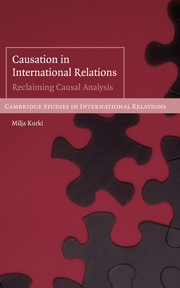Book contents
- Frontmatter
- Contents
- List of figures
- Acknowledgements
- Introduction: the problem of causation and the divided discipline of International Relations
- Part I The Humean philosophy of causation and its legacies
- Part II Rethinking the concept of cause
- Part III Reconfiguring causal analysis of world politics
- 7 Expanding horizons in world political causal inquiry
- 8 Reconceptualising causes, reframing the divided discipline
- References
- Index
- CAMBRIDGE STUDIES IN INTERNATIONAL RELATIONS
7 - Expanding horizons in world political causal inquiry
Published online by Cambridge University Press: 22 September 2009
- Frontmatter
- Contents
- List of figures
- Acknowledgements
- Introduction: the problem of causation and the divided discipline of International Relations
- Part I The Humean philosophy of causation and its legacies
- Part II Rethinking the concept of cause
- Part III Reconfiguring causal analysis of world politics
- 7 Expanding horizons in world political causal inquiry
- 8 Reconceptualising causes, reframing the divided discipline
- References
- Index
- CAMBRIDGE STUDIES IN INTERNATIONAL RELATIONS
Summary
The previous chapter argued that by ‘deepening’ and ‘broadening’ the meaning of the concept of cause we gain a radically different understanding of causation in comparison with the approach followed by the Humeans. Against sceptics that deny the reality of causes, causes are here conceived to have real ontological existence, in both the natural and the social worlds, and the goal of causal explanation, in both realms, is seen to consist in constructing conceptual models that provide understandings of the nature of and interaction between various kinds of causal forces. The Aristotelian conceptual system, I have argued, can direct the ways in which we conceptualise different kinds of causal powers: causes can be conceptualised to range from material resources to normative frameworks, from agent's intentions and actions to social structural relations, and each factor can be seen as causal in a distinct manner. By opening up the issue of causation in IR ontologically, methodologically and epistemologically, the reconceptualised notion of cause can help us deal with some of the theoretical problems that characterise existing treatments of causation in IR. It allows us to reinterpret some divisive theoretical issues that IR scholars have grappled with recently, notably the causal–constitutive theory divide and the tendency towards theoretical reductionism.
- Type
- Chapter
- Information
- Causation in International RelationsReclaiming Causal Analysis, pp. 245 - 288Publisher: Cambridge University PressPrint publication year: 2008
- 1
- Cited by



